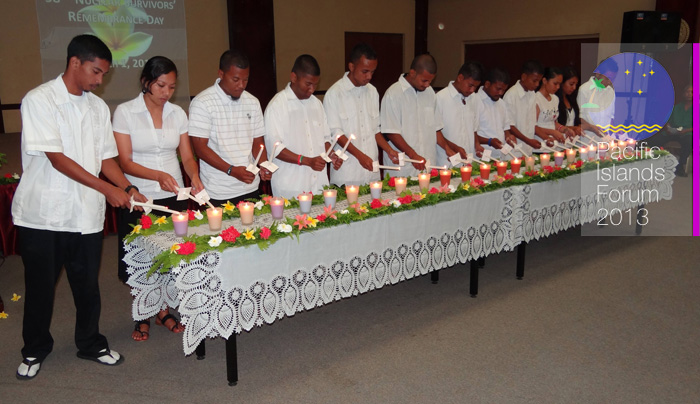In its campaign to garner support for a proposed Majuro Declaration on Climate Leadership at this week’s Pacific Islands Forum summit in Majuro, the Marshall Islands government has back-burnered its long-standing concerns about unmet compensation, medical care, and clean up needs stemming from the United States nuclear testing program at Bikini and Enewetak. This doesn’t mean there isn’t an effort going into securing language on the nuclear issue in the closing communiqué that will be issued Thursday this week after the leaders’ retreat. But while the U.S. nuclear legacy remains an important outstanding problem in the US-Marshall Islands relationship, it won’t be a major item on the Forum’s agenda.
In fact, every year since the Forum meeting in Papua New Guinea in 1995, the communiqué has contained a section recognizing the “special circumstances pertaining to the continued presence of radioactive contaminants in the Republic of the Marshall Islands.” It has also called “on the United States of America to live up to its full obligations on the provision of adequate compensation and commitment to its responsibility for the safe resettlement of displaced populations, including full restoration to economic productivity and human enjoyment of all affected areas.”
Last year’s Forum communiqué, adopted in the Cook Islands, updated the sentiment of support from the region by including a sentence about the planned presentation of a United Nations Special Rapporteur’s report to the UN Human Rights Council in Geneva the month after the August Forum Leaders’ meeting.
The 19-page Special Rapporteur’s report on the Marshall Islands, issued in September 2012, was groundbreaking because it offered one of the first independent evaluations of the nuclear test legacy in the Marshall Islands. Generally, commentary on the US nuclear testing program takes either the US government’s view or is vehemently critical. The dispassionate appraisal by Special Rapporteur Calin Georgescu lends significant credibility to the report. In actuality, any independent review of the US nuclear testing will be critical because of the US government’s actions in relocating at whim islanders who were its wards under the UN Trusteeship Agreement, exposing them to nuclear test fallout, covering up reports about fallout exposure, repeatedly re-exposing islanders to radioactive environments that American scientists declared safe, and declaring as “full and final” a compensation settlement that was negotiated in bad faith and is clearly inequitable when contrasted with the compensation system accorded American “Downwinders” who lived near the US nuclear test site in Nevada.
Special Rapporteur Georgescu takes an even-handed approach in his report, commenting: “The nuclear testing and the experiments have left a legacy of distrust in the hearts and minds of the Marshallese. The deep fissure in the relationship between the two Governments presents significant challenges; nonetheless the opportunity for reconciliation and progress, for the benefit of all Marshallese, is there to be taken.”
He listed several pages of recommended actions for the US and Marshall Islands governments, and for United Nations agencies. Ironically, the Special Rapporteur’s report represents the first effort by the UN to address nuclear testing problems in the Marshall Islands — nuclear testing that its own Trusteeship Council endorsed in 1954 and 1956, brushing aside petitions from Marshall Islanders calling, politely, for a halt to nuclear tests that had exposed thousands of Marshallese to radioactive fallout and health injuries, and resulted in forced evacuations of hundreds of islanders.
Key recommendations in the report call on the US government to pay all of the Nuclear Claims Tribunal’s compensation awards. To this day, not a single Marshall Islands nuclear victim has received 100 percent of their compensation for lack of funds, and most have died in the interim. As well, the Tribunal made only token payments on the large monetary awards for four of the nuclear test-affected atolls that sought compensation for nuclear cleanups, loss of use of land, and hardship. The UN report also recommended a comprehensive independent radiological survey be conducted through the auspices of the United Nations, and urged development of a comprehensive national health strategy to address cancer and non-communicable diseases.
This week, Marshall Islands officials hope to gain Forum leaders’ endorsement of the UN Special Rapporteur’s report. In light of last year’s Forum communiqué that made special mention of what was then a soon-to-be-released report, it shouldn’t be difficult to gain approval for a sentence in the communiqué endorsing the report. Because of the heavy focus of government leaders on climate change action in the lead up to the Forum, little has been done by the Marshall Islands in the year since the UN report was presented to the Human Rights Council. Officials in Majuro say that is expected to change as they look to engaging the United Nations system in response to various aspects of the nuclear legacy — as recommended by the Special Rapporteur. A Forum vote of support, in the form of a paragraph in the communiqué, will give the Marshall Islands further leverage internationally as it pursues, however haltingly, a resolution to the impact that 12 years and 67 nuclear weapons tests caused in the Marshall Islands.



